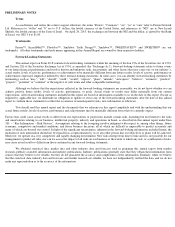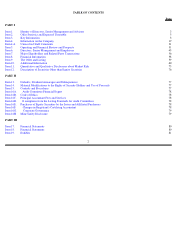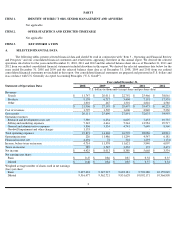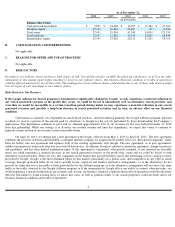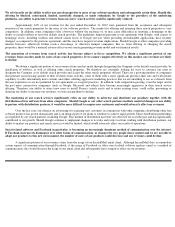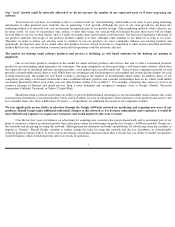Incredimail 2012 Annual Report Download - page 15
Download and view the complete annual report
Please find page 15 of the 2012 Incredimail annual report below. You can navigate through the pages in the report by either clicking on the pages listed below, or by using the keyword search tool below to find specific information within the annual report.
A loss of the services of our senior management and other key personnel could adversely affect execution of our business strategy.
We depend on the continued services of our senior management, particularly Josef Mandelbaum, our Chief Executive Officer. Our
current strategy is to a great extent a function of his capabilities and experience, together with the experience and knowledge of our other senior
management. The loss of the services of these personnel could create a gap in management and could result in the loss of expertise necessary for
us to execute our business strategy and thereby adversely affect our business. We do not currently have "key person" life insurance with respect
to any of our senior management.
Further, our ability to execute our business strategy also depends on our ability to continue to attract, retain and motivate qualified and
skilled technical and creative personnel and skilled management, marketing and sales personnel. If we cannot attract and retain additional key
employees or lose one or more of our current key employees, our ability to develop or market our products and attract or acquire new users could
be adversely affected. See "Item 6 Directors, Senior Management and Employees."
Under current Israeli law, we may not be able to enforce non-
competition covenants and, therefore, may be unable to prevent our
competitors from benefiting from the expertise of some of our former employees.
We have entered into non-
competition agreements with most of our professional employees. These agreements prohibit our employees,
if they cease working for us, from competing directly with us or working for our competitors for a limited period. Under current Israeli law, we
may be unable to enforce these agreements, in whole or in part, and it may be difficult for us to restrict our competitors from gaining the
expertise that our former employees gained while working for us. For example, Israeli courts have required employers seeking to enforce non-
compete undertakings of a former employee to demonstrate that the competitive activities of the former employee will harm one of a limited
number of material interests of the employer which have been recognized by the courts, such as the secrecy of a company’
s confidential
commercial information or its intellectual property. If we cannot demonstrate that harm would be caused to us, we may be unable to prevent our
competitors from benefiting from the expertise of our former employees.
Our international operations involve special risks that could increase our expenses, adversely affect our operating results and require
increased time and attention of our management.
We derive and expect to continue to derive a substantial portion of our revenues from users outside United States. Our international
sales and related operations are subject to a number of inherent risks, including risks with respect to:
•
potential loss of proprietary information due to piracy, misappropriation or laws that may be less protective of our intellectual
property rights than those of the United States;
•
costs and delays associated with translating and supporting our products in multiple languages;
•
foreign exchange rate fluctuations and economic instability, such as higher interest rates and inflation, which could make our
products more expensive in those countries;
•
costs of compliance with a variety of laws and regulations;
•
restrictive governmental actions such as trade restrictions;
•
limitations on the transfer and repatriation of funds and foreign currency exchange restrictions;
•
compliance with different consumer and data protection laws and restrictions on pricing or discounts;
•
lower levels of adoption or use of the Internet and other technologies vital to our business and the lack of appropriate
infrastructure to support widespread Internet usage;
•
lower levels of consumer spending on a per capita basis and fewer opportunities for growth in certain foreign market segments
compared to the United States;
•
lower levels of credit card usage and increased payment risk;
•
changes in domestic and international tax regulations; and
•
geopolitical events, including war and terrorism.
11


